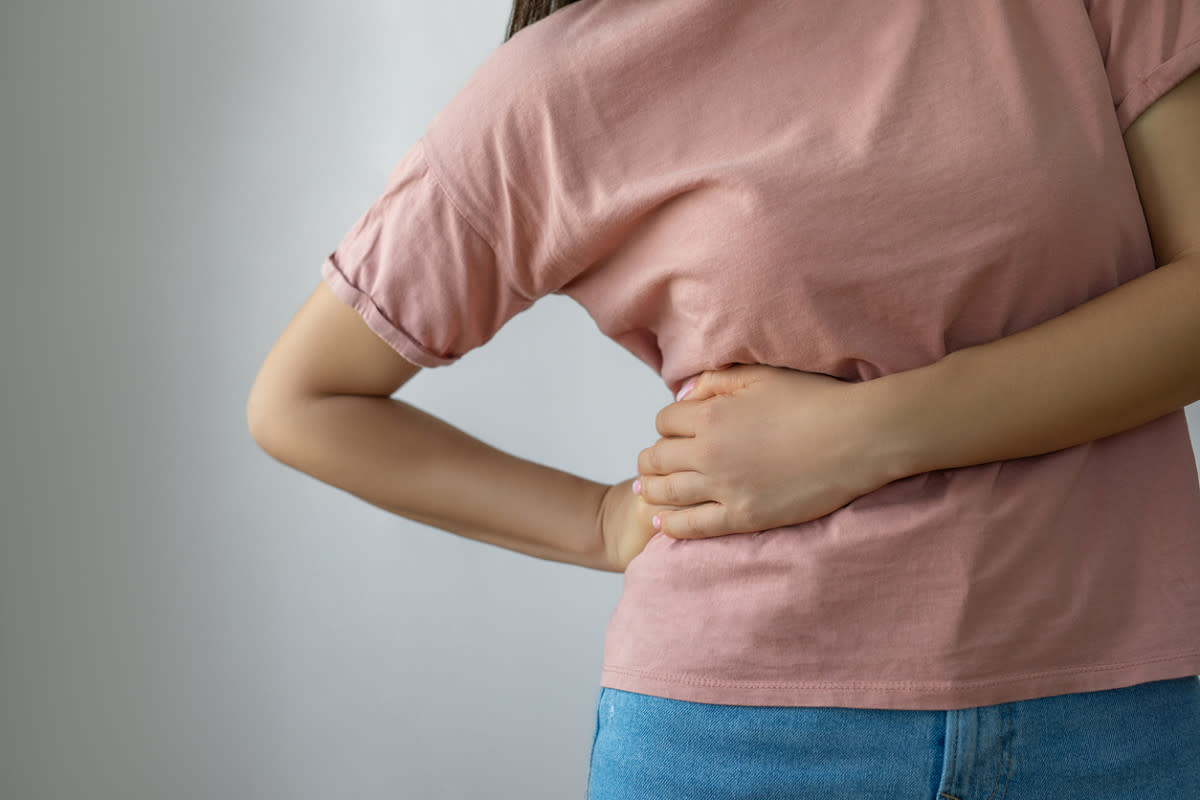This Is the #1 Sign That Someone Has Healthy Kidneys, According to a Nephrologist

Woman putting pressure on her kidneys
The kidneys are one of those organs that we often take for granted—until there’s a problem. But the kidneys are extremely important, always working in the background to keep us healthy (and, quite frankly, alive) by regulating fluid levels in the body, filtering waste and toxins from the blood, and regulating blood pressure.
But how exactly can you know what kind of shape your kidneys are in? After all, it’s not like you can see them. Here, a nephrologist shares the number one way to know your kidneys are healthy, warning signs that there could be something wrong, and ways to support your kidney health.
Related: The Common Habit That Could Be Damaging Your Kidneys, According to a Nephrologist
The #1 Sign of Healthy Kidneys
Dr. Jeffrey R. Schelling, MD, a nephrologist and professor in the Department of Physiology and Biophysics at Case Western University School of Medicine, explains that the kidneys are super resilient organs. In fact, you could be completely unaware that there is a problem while having as little as 10 percent normal kidney function. That’s why he says that the best way to know if your kidneys are healthy or not is through routine blood and urine work ordered by your doctor.
One of these tests is a blood test called an estimated glomerular filtration rate (eGFR). This test measures how well your kidneys are working. The other test is a urine test called urine albumin-creatinine ratio (uACR). This test shows whether you have albumin (a type of protein found in blood) in your urine. Since part of the kidney’s job is to filter blood, if this blood protein is found in your urine, it’s a sign that the kidneys are not functioning properly. With all of this in mind, the number one sign of healthy kidneys is good eGFR and uACR test results.
Related: The #1 Habit That Can Make Your Kidneys Healthier, According to a Nephrologist
Dr. Schelling says that physical symptoms of kidney problems don’t occur until kidney disease is quite advanced. “Once kidney function declines to less than 25 percent of normal function, there can be many symptoms, which reflect the accumulation of toxins and fluid that the kidneys normally excrete as urine,” he explains.
He adds that the biggest symptoms to look out for are ankle swelling and shortness of breath—both of which happen due to the accumulation of excess fluid.
How To Keep Your Kidneys Healthy
Unfortunately, Dr. Schelling says that chronic kidney disease is common. An estimated 15 percent of adults in the U.S. have chronic kidney disease. “One in seven people in the United States have kidney function that is less than half of normal,” he explains. That’s why it’s important to know how to keep your kidneys healthy.
“The biggest risks for chronic kidney disease are diabetes and high blood pressure,” Dr. Schelling says. To avoid these chronic conditions, which in turn impact the kidneys, he says that the best way to keep your kidneys healthy is by maintaining a healthy diet and minimizing sodium intake. (A good goal to aim for is less than 2,300 milligrams of sodium a day, as recommended by the American Heart Association.) Eating nutrient-rich foods, minimizing processed foods, and drinking plenty of water are all dietary habits that support kidney health.
Related: The Most Common Signs of Kidney Cancer Doctors Want Everyone To Know About
Additionally, Dr. Schelling says that exercising regularly also supports kidney health because it helps maintain a healthy weight, decreasing the risk of diabetes and high blood pressure.
For individuals who already have diabetes or high blood pressure, Dr. Schelling says that controlling these conditions is key for keeping your kidneys healthy. This could mean following a heart-healthy diet, like the Mediterranean diet or DASH diet, and working with a registered dietitian or nutritionist who can help you follow a healthy diet in a way that works for your lifestyle and includes foods you like the taste of.
Dr. Schelling emphasizes that chronic kidney disease is a “silent” disease, meaning many people often don’t know they have it until it’s quite progressed. That’s why it’s important to take care of your kidneys by following a healthy diet, exercising regularly, and seeing your doctor regularly for blood and urine tests that check kidney health. By doing all of this, you can drastically lower your risk of chronic kidney disease—and that’s pretty empowering!
Next up, here's what you need to know about cardiovascular kidney metabolic syndrome.
Sources
Dr. Jeffrey R. Schelling, MD, nephrologist and professor in the Department of Physiology and Biophysics at Case Western University School of Medicine
Blood test: eGFR (estimated glomerular filtration rate). American Kidney Fund.
Kidney Failure Risk Factor: Urine Albumin-Creatinine Ratio (uACR). National Kidney Foundation.
Chronic Kidney Disease Basics. Centers for Disease Control and Prevention.
How much sodium should I eat per day? American Heart Association.
Solve the daily Crossword

